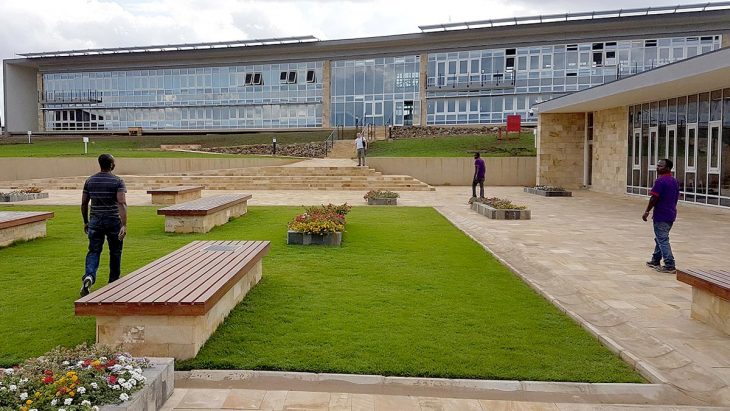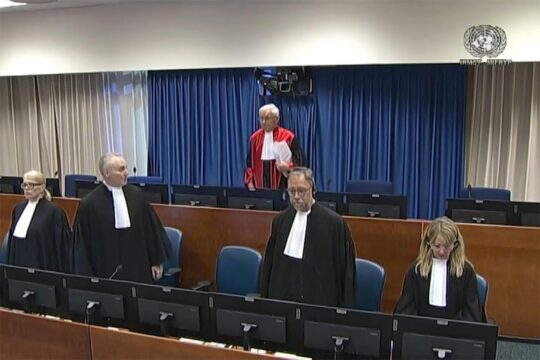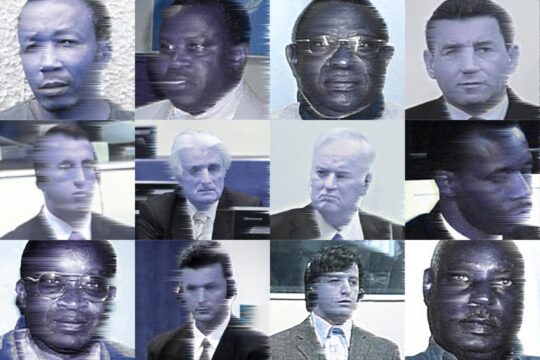Augustin Ngirabatware is the son-in-law of Félicien Kabuga, a man of influence in Rwanda in the 1990s and the most notorious of the ICTR indictees who have not been caught. Born in 1957 in the commune of Nyamyumba in Gisenyi prefecture (northern Rwanda), Ngirabatware holds a doctorate in economics from the University of Fribourg (Switzerland). He taught at the National University of Rwanda before being appointed Minister of Planning in 1990. Known as rigorous, this member of the former ruling MRND party was appreciated by Rwanda's donors and even by the emerging opposition, something that was extremely rare at the time. He kept his post in the interim government formed on April 8, 1994, two days after the assassination of President Juvenal Habyarimana.
After fleeing his country in July 1994, the Rwandan economist worked for research institutes in Gabon and France. In addition to this work, he published in August 2006 a book critical of the ICTR, entitled "Rwanda: The Rise of Lies and Injustice", published by Sources du Nil. In his book, Ngirabatware, who knew he was wanted by international justice, states that the Arusha court was "set up by the UN on false premises" and "cannot do justice", according to a summary by the publisher.
Accused of preaching genocide
In 2007, the former minister was arrested in Frankfurt, Germany, and transferred to ICTR headquarters in Arusha, Tanzania, a year later. His first trial began in September 2009. Ngirabatware was charged with conspiracy to commit genocide, genocide, direct and public incitement to commit genocide, and crimes against humanity (including rape). In his opening statement, prosecutor Wallace Kapaya told the court that Ngirabatware held "several meetings" in his native region of Gisenyi in 1994 "to spread the gospel of genocide", repeatedly insisting that no Tutsi survive. The Tanzanian lawyer accused him of distributing weapons to Interahamwe militiamen in his home town of Nyamyumba.
The prosecutor did not stop there. He added that Ngirabatware had abused his position to divert funds from various donors such as the World Bank, the United States and Belgium for the benefit of the Interahamwe militia. He "used his connections, political power and level of education" as part of a "joint criminal enterprise" aimed at destroying all or part of the Tutsi ethnic group, Kapaya alleged. As Minister of Planning, a recognized academic and son-in-law of Kabuga, himself related by marriage of President Juvenal Habyarimana, the accused would have been "an indispensable link in this criminal enterprise", the prosecutor asserted.
"Contradictory or misleading" testimonies
Undaunted, in suit and tie, the former minister closely followed the prosecutor's statement, sometimes exchanging views with his defence team led by British lawyer Peter Herbert. After the prosecutor's witnesses had testified, the defence opened its case on 16 November 2010. "I ask you to conclude that my client is innocent because that's what he deserves. The people of Rwanda need justice," Herbert told the court. "Augustin Ngirabatware does not fear evidence, does not fear a fair trial, does not fear those who conduct it and understands the need for leaders to be held accountable for the suffering of their people. What he fears is a court that bends under pressure and may be afraid to acquit for fear of political repercussions. That's what he fears."
After denouncing charges based on "contradictory” or "deliberately false" statements, the lawyer focused on his client's alibi for the period from 6 to 12 April 1994. The former minister allegedly went at that time to his father's home in the commune of Nyamwumba to supervise arms distribution. "We have very strong alibi witnesses on this point," the lawyer said, finding the allegation "as ridiculous as suggesting that Tony Blair himself went on a bombing mission in Iraq”. Ngirabatware claims to have sought refuge after the assassination of President Habyarimana first at the presidential guard camp in Kigali, then at the French embassy, before flying to Burundi. "I did not leave Kigali between April 6 and 8, 1994. All this is false, entirely false, even unthinkable," protested the former minister during his testimony on November 26, 2010.
Presentation of new facts
The Trial Chamber's judgment came on 20 December 2012. Ngirabatware was found guilty of "genocide, direct and public incitement to commit genocide and rape". According to the court presided by Tanzanian judge William Hussein Sekule, the former minister incited, assisted and encouraged militiamen in his native Nyamyumba commune to kill their Tutsi neighbours and rape Tutsi women in April 1994. Ngirabatware was sentenced to 35 years' imprisonment. However, on 18 December 2014, the Appeals Chamber acquitted him on the charge of "rape as a crime against humanity" and reduced the sentence to 30 years.
Protesting his innocence, Ngirabatware refused to admit defeat. In an application filed on 8 July 2016 with the Mechanism for International Criminal Tribunals (MICT), which performs the residual functions of the ICTR, the former leader requested a review of his trial, explaining there were new facts exempting him from liability for the crimes for which he had been convicted. On June 19, 2017, the MICT granted it. "This is the first time the Mechanism has granted a request for a review of a final judgment," the MICT said in a statement.
Defence team arrested in Rwanda
Initially scheduled for February 2018, the review hearing has been postponed twice. First, to allow the new defence lawyer, Diana Ellis, to study the voluminous file. Then in early September 2018, with hearings announced for the end of the month, five Rwandans were arrested in their country, accused by the MICT prosecutor of tampering or attempting to tamper with and intimidate witnesses to obtain statements in favour of the former minister. The five include Dick Prudence Munyeshuli, a lawyer who worked as an investigator in Ngirabatware's defence team. These arrests resulted in a further delay.
The hearings are therefore finally starting on 16 September, after the Chamber rejected a prosecution request to further delay it until after the judgment in the Munyeshuli case. The hearings, scheduled to last until 27 September, will take place before a panel of five judges led by the former president of the MICT, Judge Theodor Meron, a number of whose decisions have angered the Rwandan authorities. Kigali criticizes the American judge for having granted early release to many convicts and for sentence reductions on appeal.
Corrections were made on the first version of this article due to an error in translation. The case is not a “re-trial”, as wrongly stated in English, but a review of the final judgment.







